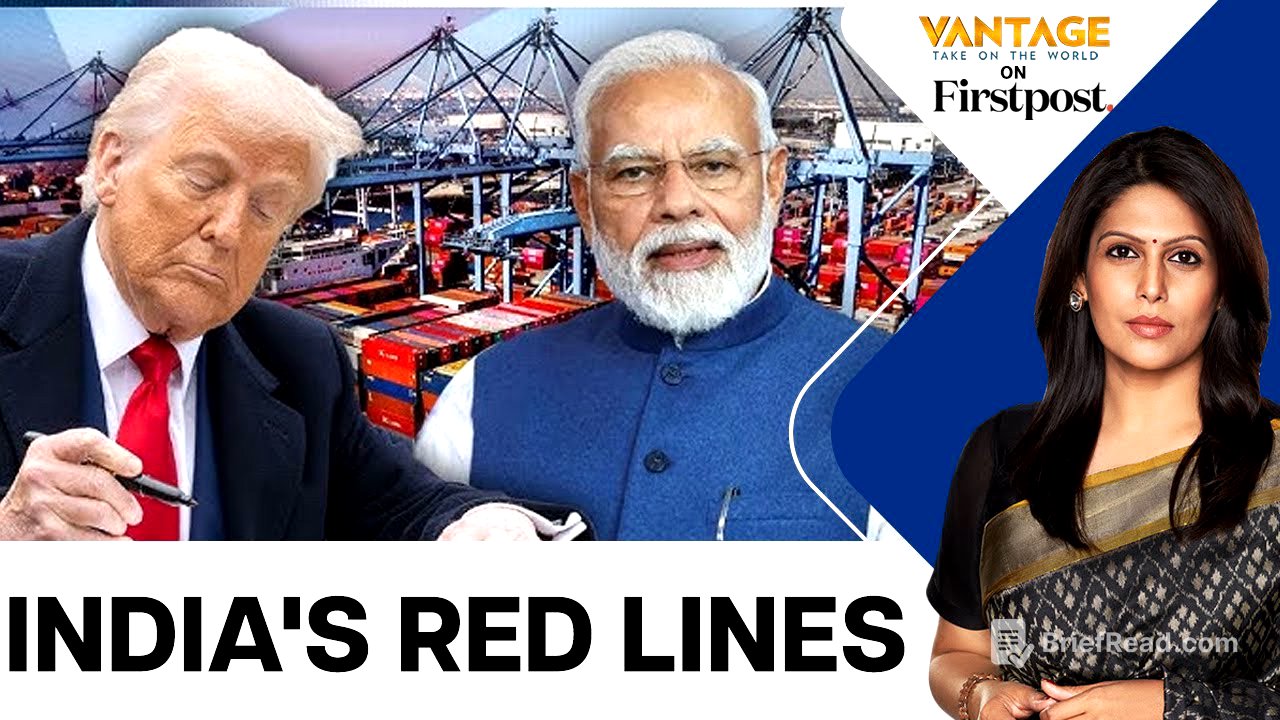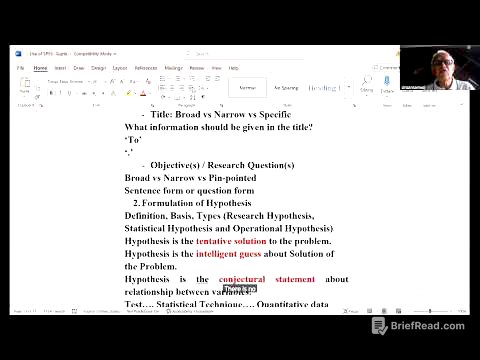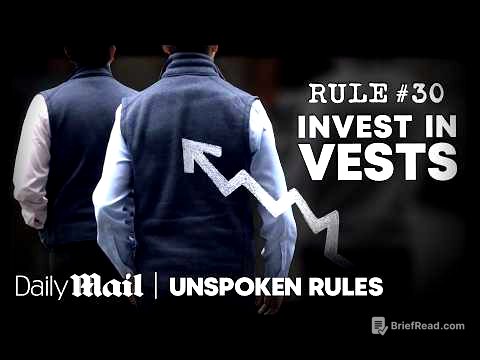TLDR;
This episode of Vantage discusses Donald Trump's new tariffs and their global impact, particularly on India. It examines the countries most affected, the exemptions granted, and the potential consequences for American consumers. The episode also explores the stalled trade talks between the US and India, India's red lines, and the political storm sparked by Trump's comments on the Indian economy. Furthermore, it analyses Trump's strategy of using tariffs as leverage, the potential for geopolitical standoff with Russia, and the broader economic implications of protectionism. Finally, it touches on AI's impact on job market and origin of potato.
- Trump's tariffs are broad but with specific exemptions, impacting various countries and industries differently.
- Trade talks between the US and India have stalled due to disagreements over agriculture and defence.
- Trump's use of tariffs as leverage against Russia could lead to geopolitical instability.
- AI is reshaping the job market, with some jobs at higher risk of automation than others.
Introduction [0:05]
The show introduces the topic of Donald Trump's new tariffs, drawing a parallel to the Smoot-Hawley Tariff Act of 1930, which exacerbated the Great Depression. It outlines the key questions to be addressed: who is most affected by the tariffs, who has been spared, and who will ultimately pay the price. The impact on India-US relations and the political storm sparked by the tariffs in India are also highlighted.
News Headlines [1:36]
The news headlines cover several global events, including Pakistan's call for Afghans to leave the country, Israeli air strikes in Lebanon, a deadly Russian attack on Kiev, talks between the Democratic Republic of Congo and Rwanda in the US, and South Korea's impeached former President resisting questioning.
Trump's Tariff Blitz [3:13]
The segment discusses the wide-ranging tariffs imposed by Donald Trump, some reaching as high as 50%, affecting allies and rivals alike. It notes the lack of a clear plan to end these tariffs and suggests that many decisions appear to be personal. Asia is bearing the brunt of these tariffs, with Myanmar and Laos being the worst hit at 40%. While some countries like Indonesia, Malaysia and Philippines facing 19% tariff. Pakistan is also facing 19% tariff due to geoeconomic flirtation. Syria is facing 41% tariff. Canada has been hit with 35% tariffs. The EU, Japan and UK have negotiated lower rates. China, still in negotiations, has not been hit in this round. The segment raises the question of who will bear the cost of these tariffs, suggesting it will likely be the American consumer.
The Cost for American Households [7:47]
The segment explains that tariffs are essentially taxes on exports, using the example of a $100 shirt from India now costing $125 due to a 25% tariff. This cost is likely to be passed on to the American consumer, resulting in US households paying over $1,000 more annually. While Trump is taxing the world, Americans are picking up the bill.
Surgical Tariffs and Exemptions [8:52]
The segment notes that Trump's tariffs are surgical, with a carefully crafted list of exemptions, excluding goods worth billions of dollars. Big tech companies like Lenovo and Samsung have avoided $7 billion in tariffs, while industries like oil and gas, Bitcoin mining, pharma, and medical device makers have also saved billions. Brazil, despite a headline 50% tariff, has received numerous exemptions. India too has certain industries spared, including pharma, copper, iron and aluminium. However, the tariffs are still expected to negatively impact India's GDP growth.
India-US Trade Stalemate [12:35]
The segment discusses the stalled trade talks between India and the US, with both sides blaming each other. Trump has called India's trade barriers obnoxious and its economy dead, while American officials accuse India of slow-rolling negotiations. India has already made concessions by cutting tariffs on whiskey and motorbikes, increasing defence purchases, and buying more American gas. However, agriculture and fighter jets remain red lines for India. Trump wants the Japan template for India, but India wants a free trade deal template.
Political Firestorm in India [18:40]
The segment examines the political fallout in India following Trump's comments on the Indian economy. While most leaders have united against Trump's remarks, opposition leader Rahul Gandhi has endorsed them, sparking criticism from his own party and the ruling party. The Indian government asserts that it will protect the interests of farmers, workers, and entrepreneurs.
Trump's Leverage and Russia [22:50]
The segment analyses Trump's strategy of using tariffs as leverage, particularly against Russia. He has issued an ultimatum to Moscow to cut a deal or face secondary tariffs, targeting countries that buy Russian oil, such as India and China. Indian state refiners have already paused purchases of Russian oil in anticipation of sanctions. Russia has responded with a warning, referencing the "dead hand" nuclear system, suggesting a potential geopolitical standoff.
Economic Impact and Projections [28:36]
The segment discusses the potential economic consequences of Trump's tariffs, drawing parallels to the protectionism of the 1930s. Bloomberg expects a massive hit to the global economy, almost $2 trillion by 2027. The OECD and WTO have also lowered their global GDP growth projections. American consumers will face increased inflation, and companies like Apple and Ford are already bracing for significant financial hits.
Trump's Nobel Peace Prize Ambitions [32:51]
The segment satirises the White House's demand for a Nobel Peace Prize for Donald Trump, highlighting his bombing record and aid cuts. It argues that Trump's actions disqualify him from the prize and suggests he would likely commercialise the award. The segment lists various reasons to disqualify Trump, including sexism, racism, and warmongering.
AI and the Job Market [37:33]
The segment discusses a Microsoft report analysing the impact of AI on the job market. It identifies jobs at the highest risk of being replaced by AI, including translators, historians, writers, customer service representatives, and journalists. However, jobs involving physical movement and the human touch, such as healthcare professionals and manual labourers, are considered safer. The segment advises adapting to AI and focusing on human skills.
The Origin of Potatoes [41:44]
The segment discusses a new study revealing that potatoes evolved from tomatoes more than 9 million years ago. Scientists analysed potato lineages and found a mixed ancestry, with potatoes being hybrids of a tuberus and wild tomato plants. This hybridization allowed potatoes to develop tubers, the edible underground storage organs.
India's Diplomatic Journey [45:34]
The segment explores India's diplomatic history, from its early days of non-alignment during the Cold War to its current multi-alignment strategy. It discusses the challenges and lessons learned from past conflicts and economic dependencies. India has moved from being a global aid recipient to a global donor and is now a key player in various multilateral forums.
Trump's White House Renovation [1:00:12]
The segment briefly mentions Donald Trump's plan to renovate the White House, adding a new $200 million ballroom, which has sparked controversy due to its timing amid a housing crisis in America.
Vantage Shots [1:01:54]
The episode concludes with a series of images depicting various news events, including an amusement park accident in Saudi Arabia, flooding in New York, and the discovery of a giant stick bug in Australia. It also revisits the 1936 Berlin Olympics.



![Learn Python - Full Fundamental Course for Beginners | Python Tutorial for Beginners [2019]](https://wm-img.halpindev.com/p-briefread_c-10_b-10/urlb/aHR0cDovL2ltZy55b3V0dWJlLmNvbS92aS92X1M2NGtsZHJ5Yy9ocWRlZmF1bHQuanBn.jpg)





